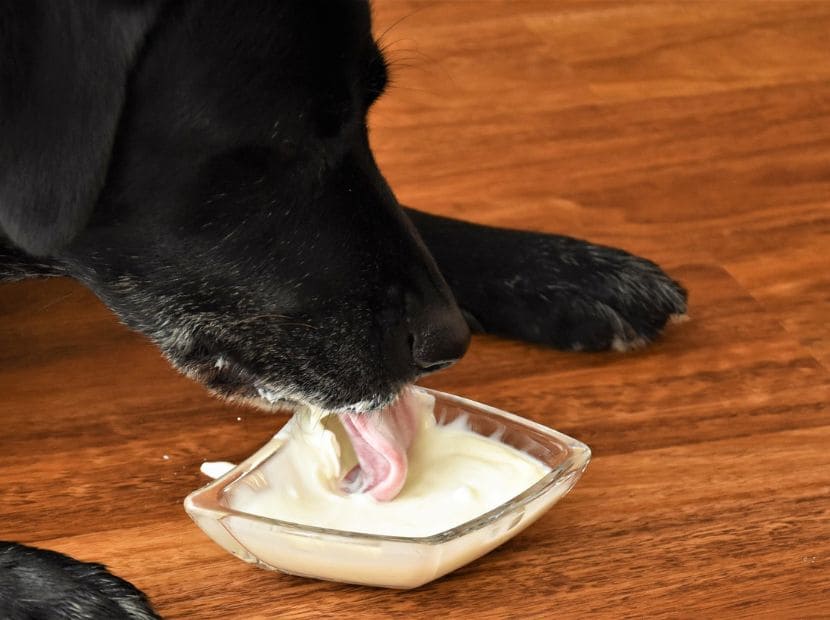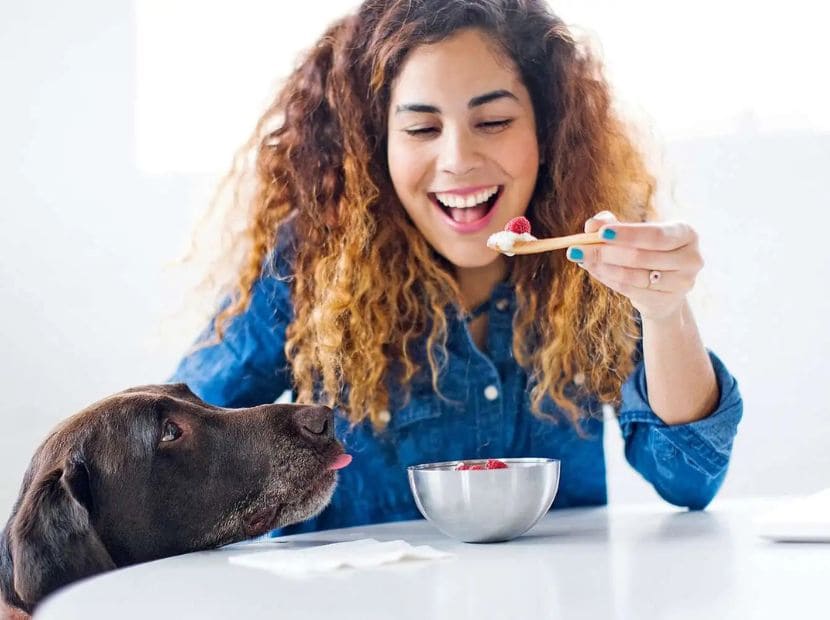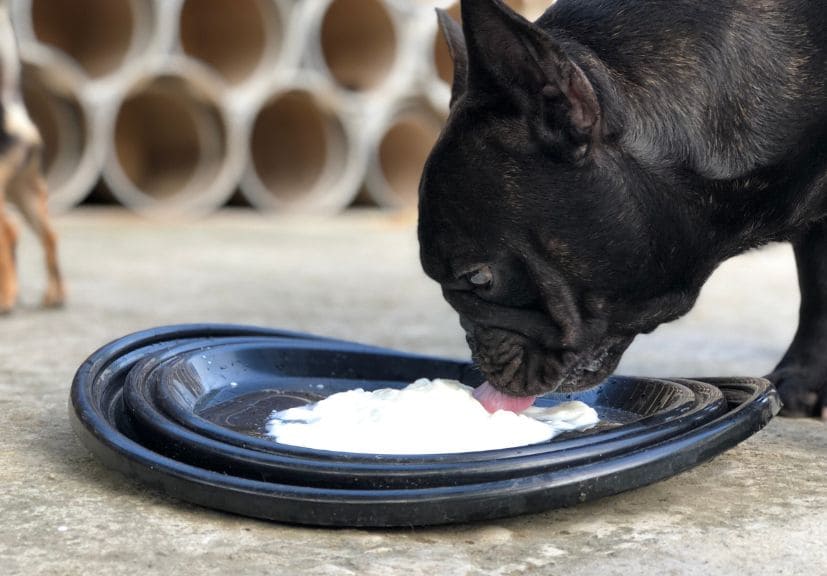Can Dogs Eat Yogurt?

The short answer is yes, yogurt generally falls in the list of safe dog foods—but not all types of yogurt are created equal. Certain varieties can offer health benefits, while others should be avoided due to ingredients that may not agree with your dog’s digestive system.
Health Benefits of Yogurt for Dogs
Yogurt can be a nutritious snack for dogs when given in moderation. Here are some of the key benefits:
Probiotics for Digestive Health
One of the main advantages of feeding yogurt to your dog is the presence of probiotics, which are live cultures that promote healthy digestion. These beneficial bacteria help balance the gut microbiome, making yogurt for dog diarrhea a potentially helpful remedy. Some brands, such as Oikos yogurt, contain probiotics that can support digestive health in both dogs and humans.
Rich in Calcium and Protein
Yogurt is an excellent source of calcium, which supports bone health, and protein, which is essential for muscle repair and growth. Greek yogurt for dogs is particularly high in protein, making it an even better option for your pup.
Promotes Healthy Skin and Coat
Some dog owners report that feeding their dogs yogurt improves the health of their dog’s skin and coat. Yogurt for dogs’ skin can be a good source of vitamins and minerals that support overall wellness.
Immune System Support
The probiotics in yogurt not only promote digestive health but also play a role in boosting your dog’s immune system. A healthy gut helps protect your dog from harmful bacteria and infections, which can reduce the frequency of illnesses. Regular consumption of probiotic yogurt for dogs may enhance their body’s natural defenses.
Weight Management
If your dog is on a weight management plan, low-fat or fat-free plain yogurt can be a healthy treat alternative. It’s low in calories but still provides satisfying protein and calcium, helping your dog feel full without adding too many extra calories. Plus, yogurt can be mixed with fresh vegetables for a more balanced snack.
Allergy Relief
Some dogs suffer from food or seasonal allergies that can lead to skin irritation, itching, or inflammation. Yogurt for dogs’ skin might help alleviate these symptoms. The probiotics and healthy bacteria in yogurt can help reduce allergic reactions by improving gut health and reducing inflammation in the body.
Incorporating yogurt into your dog’s diet can provide a variety of health benefits, but always remember to introduce it in moderation and monitor how your dog reacts.
How To Safely Feed Yogurt To Dogs?
To safely feed yogurt to your dog, follow these simple guidelines:

Choose the Right Type
Opt for plain, unsweetened yogurt with no added sugars or artificial sweeteners. Flavored yogurts, especially those with xylitol, can be toxic to dogs. Greek yogurt for dogs is an excellent choice because it’s lower in lactose and higher in protein. Avoid ingredients like vanilla or fruit flavorings, which can contain harmful additives.
Start Slowly
Introduce yogurt gradually, starting with a small amount. This allows you to monitor your dog’s reaction, particularly if they are lactose intolerant. A teaspoon or tablespoon of yogurt mixed into their food is a safe way to begin.
Moderation is Key
Feed yogurt as an occasional treat, not a daily meal. While yogurt for dogs offers health benefits, too much can lead to digestive issues. For dogs with sensitive stomachs or diarrhea, small amounts of yogurt for dog diarrhea can help with gut health, but always consult your vet if problems persist.
Check Ingredients
Make sure the yogurt is free of toxic additives like pectin or xylitol, and choose probiotic-rich brands, such as Oikos yogurt, to support your dog’s digestion.
By following these steps, you can safely incorporate yogurt into your dog’s diet.
Risks of Feeding Yogurt to Dogs
While yogurt can be beneficial, there are some risks to be aware of:
Lactose Intolerance
Some dogs are lactose intolerant, meaning they may have trouble digesting dairy products like yogurt. Signs of lactose intolerance include gas, bloating, and diarrhea. It’s always a good idea to introduce yogurt in small amounts to see how your dog reacts. If your dog experiences digestive upset, such as gas from Greek yogurt, it may not be suitable for them.
Added Sugars and Artificial Sweeteners
Avoid flavored yogurts or those with added sugars, especially artificial sweeteners like xylitol, which is highly toxic to dogs. Plain, unsweetened yogurt is the best choice for dogs.
Fat Content
Full-fat yogurts can contribute to weight gain or pancreatitis in dogs, especially in those prone to such conditions. Opt for low-fat or fat-free varieties if you’re concerned about your dog’s calorie intake. If your dog has been diagnosed with a condition like pancreatitis, it’s important to consult your vet before offering any dairy products, even if they’re low in fat.
Best Types of Yogurt for Dogs
When choosing a yogurt for your dog, it’s important to consider the type of yogurt and its ingredients. Here are some of the best options:
Plain, Unsweetened Greek Yogurt
This is often the best choice because it is higher in protein and lower in lactose compared to regular yogurt. It also contains beneficial probiotics. Greek yogurt for dogs with diarrhea can help restore balance to their gut microbiome, making it a great option for dogs with digestive issues.
Coconut Yogurt
If your dog is lactose intolerant or you prefer a dairy-free option, you may wonder, can dogs eat coconut yogurt? The answer is yes, as long as it’s plain and free of added sugars or artificial sweeteners. Coconut yogurt is often a safe alternative for dogs with sensitive stomachs or lactose intolerance.
Lactose-Free Yogurt
Many grocery stores, including Whole Foods, offer lactose-free yogurt, which can be a good option for dogs that have trouble digesting regular yogurt. It still provides the same nutritional benefits without the risk of upsetting your dog’s stomach.
Yogurt Brands with Probiotics
If you’re looking for the best brand of yogurt for dogs, look for those with active probiotic cultures. Brands like Oikos and Chobani often contain probiotics that can help with digestion. However, make sure they are plain and unsweetened varieties to avoid harmful ingredients. Also, ensure that the yogurt doesn’t contain xylitol, as some flavored varieties might.
How Much Yogurt Should You Give Your Dog?
Moderation is key when feeding yogurt to your dog. Small amounts are usually sufficient to offer health benefits without overwhelming their digestive system. Here are some guidelines:
- Small Dogs: 1 teaspoon to 1 tablespoon of yogurt per day.
- Medium Dogs: 1 tablespoon to 2 tablespoons of yogurt per day.
- Large Dogs: 2 tablespoons to 4 tablespoons of yogurt per day.
It’s best to offer yogurt as a treat or a supplement to their regular meals, not as a meal replacement. Yogurt dog treats are another way to incorporate this food into their diet.
Homemade Yogurt Treats for Dogs
If you prefer to make your homemade yogurt treats for dogs, it’s easy to create tasty and healthy snacks. Mix plain yogurt with ingredients like peanut butter or pumpkin and freeze the mixture in ice cube trays for a cool, refreshing treat. Avoid adding any sugars or artificial flavors, and make sure the ingredients are dog-safe.
Yogurt and Strawberries: Can Dogs Eat This Combo?

If you’re curious about whether dogs can eat strawberry yogurt, the answer is yes, but only if it’s plain yogurt with fresh strawberries added. Avoid store-bought strawberry-flavored yogurt, which often contains added sugars or artificial flavors. Fresh strawberries provide antioxidants and fiber, which are great for your dog’s health.
Yogurt for Specific Health Conditions in Dogs
Yogurt for Dogs with Diarrhea
As mentioned earlier, yogurt for dog diarrhea can be beneficial due to the probiotics, which help regulate the digestive system. Greek yogurt for dog diarrhea is especially helpful because it contains live cultures that can aid digestion and restore balance to your dog’s gut.
Yogurt for Dogs with Upset Stomachs
Similarly, Greek yogurt for dogs with upset stomachs can calm their digestive tract. The probiotics help improve gut flora, which can be especially useful for dogs prone to digestive issues.
Can Dogs Eat Vanilla Yogurt?
While vanilla yogurt might seem harmless, it’s not the best choice for dogs. Some vanilla yogurts contain artificial sweeteners, like xylitol, which is toxic to dogs. Even if xylitol isn’t present, it’s better to stick to plain yogurt. So, if you’re wondering if vanilla is okay for dogs, the answer is to stick to plain yogurt to be safe.
When is the Best Time to Feed Yogurt to Dogs?
You might be curious about the best time of day to eat yogurt or feed it to your dog. Generally, yogurt can be given to dogs as a snack or part of their meal at any time of day. However, it’s best to introduce it during the daytime so you can monitor your dog for any signs of lactose intolerance or digestive issues.
If your dog is prone to digestive issues, offering yogurt after their meal can aid in digestion and prevent upset stomachs.
What to Avoid When Feeding Yogurt to Dogs?
- Flavored Yogurt: Avoid yogurts with added sugars, artificial flavors, or sweeteners.
- Yogurt with Xylitol: Never feed your dog yogurt that contains xylitol, as it’s extremely toxic to dogs.
- Sour Cream: Although it’s a dairy product, sour cream for dogs is not recommended due to its high fat content.
- Expired Yogurt: Be mindful of expiration dates. While you might wonder, is out-of-date yogurt safe to eat, it’s better to err on the side of caution and not give your dog expired yogurt.
Conclusion
So, can dogs eat yogurt? Absolutely, but it’s important to choose the right type and serve it in moderation. Plain, unsweetened Greek yogurt is often the best option, thanks to its high protein content and probiotics. Always avoid yogurts with added sugars, artificial sweeteners, or flavors like vanilla. If your dog suffers from digestive issues, yogurt can be a helpful addition to their diet—just be sure to monitor how they respond. Lastly, consult your vet before introducing yogurt or any new food to your dog’s diet, especially if they have health conditions like pancreatitis or lactose intolerance.
By choosing the right type of yogurt and serving it responsibly, you can give your dog a delicious treat that offers various health benefits. For more informative content like this one, keep visiting PetJazeera.




